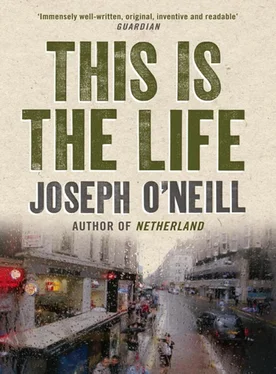When I returned from lunch I lit a cigarette and reached for my biro. I told June to forward the letters and the settlement offer to Donovan, and got on with my work.
There was a lull in the Donovan case in the weeks leading up to Christmas. Nobody was around. When I gave Donovan back his letters to Arabella and received no response, I rang Rodney to find out where he was. This was in mid-December. Vienna, Rodney told me. He had flown out on the 9th and would be gone until Christmas. After that he would go to Ireland for a short vacation.
After a moment’s hesitation I telephoned the Savoy and asked for Fergus Donovan. I wanted to tell him that Donovan had attempted to correspond with Arabella but had failed to get through. Hopefully this would cure his misapprehension that nothing was being done. Maybe then he would leave me in peace.
Mr Donovan? He checked out over a week ago, the receptionist said.
This took me by surprise. Old Fergus Donovan was not the type to throw in the towel so easily. And if he had made up his mind to leave, why had he not telephoned to tell me? I did not understand it at all.
But then, after a moment’s reflection, I saw that his departure made sense. He must have realized that nothing he could do would change the way things were heading — that it was too late now for a last-ditch patch-up. For there could be no doubt, even in that oily calm before Christmas, that things were flowing in a certain direction, that below the surface propellers were turning. Now, suddenly, the trial was just seven weeks away — and seven weeks was nothing, seven weeks would arrive in the wink of an eye. Fergus Donovan must have sensed this, sensed that we were being carried inescapably to that February hour.
For it to be appreciated how things were — to appreciate how powerful the tug of events had suddenly become — I think that resort must be made to the world of films: action films. Often, in these movies, the protagonist ends up on a raft in a river, escaping from pursuers. He traverses gulches and deer-crossed shallows and then, just as it seems that he is home and dry: rapids. White-water rapids.
He shoots the rapids. By the skin of his teeth he has zigzagged the boulders and made it through the torrents. The sun reappears, he smiles, in the cinema we all relax. We have made it.
Suddenly the camera pans in on the man’s face. He has heard something. He listens. We, in the cinema, we listen too. We lean forward in our seats, all ears.
At first, nothing. The water tinkling, a bird breaking from a tree (by now we too are on the raft, down there alongside the hero). Then, there, there it is: a distant, constant roar. What could it be? What could that sound be?
Then everybody notices something about the river: the water: it has whitened and quickened, and the raft is really moving. The current, it is suddenly clear, is far too powerful for us to jump overboard or to steer ashore. Meanwhile the roar is growing louder and louder and the raft is travelling faster and faster towards it. Then camera closes in on the hero’s face, on his horrified, wide open eyes: it has dawned on him.
The camera withdraws to a safe spot up in the woods, whisking us away with it. Down on the raft, in the booming air, there is nothing the hero can do about anything. Inexorably his vessel is sucked towards the edge of the huge waterfall …
I shall stop that story at this point, because what happens next is irrelevant. The significant moment in it, as far as I am presently concerned, is that moment when we all realize that the hero is at the mercy of the muscular water, that he is being borne wherever it wills. So it was with the Donovan case. The trial date loomed like that roar downriver and an irreversible onrush drove us all towards it.
Now it may be objected that the comparison I have just drawn is misleading: the Donovan story may have been a drama, yes, but it was a real-life drama, utterly distinct from your picture show. But to that I say: it is not so simple, this distinction. Just as, at the cinema, there is the illusion that what you see is not just a fast series of consecutive photographs of, say, a foaming river, just as it can seem that the river is foaming right there in the auditorium, so the reverse can sometimes be true: sometimes, in real life, it can feel as though you are being flashed up on some screen, as though somewhere rows of eyes are drinking in your magnified actions. I once went to a play (Susan had bought the tickets, there was no way out of it) where, out of the blue, the actors ran into the stalls and began involving the audience in the action, grabbing us by the sleeves and forcing us to our feet. I did not know what was going on, whether I was a viewer or a participant or what. At times, these last months, to my confusion and exhilaration, it has been the same. And right now, looking back at it all from my desk, I feel like a movie goer as the touched-up, superreal action rolls before my eyes …
With the trial closing up on me, I embarked upon an analysis of how it might go and what tactics to employ. Usually one leaves these things to the last possible moment, but in this case I began my preparation well in advance. I did not want to be caught out by Donovan should he suddenly fire me some question. I fetched the pleadings from my file and looked again at the allegations.
Boiled down to its essence, Arabella’s complaint was that Donovan had cruelly degraded and neglected her.
The accusation of cruelty I found rather old-fashioned. The law had moved on since the days when a wife had to show cruel behaviour which threatened her health. It was an unwisely harsh allegation to make, I thought — all that a wife needed to show these days was behaviour on the part of the husband that would make any expectation of continued cohabitation unreasonable.
Still, the question of cruelty had to be gone into. What was meant by ‘cruel’? Some guidance was to be obtained, I saw, from the case of Le Brocq. Cruel means cruel, Harman CJ defined. I looked at the facts. The husband was found to be a morose and withdrawn man. This was not due to any wilful malice on his part but due to his ‘make-up’ — ‘his conduct flows from a personality for which he is unable to help himself,’ the judge held. It could not be described as cruel. Petition rejected.
That was a possible line of argument, I reasoned. Donovan may have ignored and therefore degraded Arabella, but he did so unwittingly. He could not help it that he was so absorbed in his thoughts, and surely you could not describe absent-mindedness as cruelty? Or could you? The categories of cruelty, another authority informed me, like the categories of negligence, are never closed. Nor was there any requirement of evil or malice, I read somewhere else. Confused, I looked at the dictionary definition of cruel: disposed to inflict pain, it said. Was an unmalicious disposition to inflict pain possible?
By this stage I was beginning to have difficulties in distinguishing and cohering all the various dicta on the subject, so I put away the books. Donovan would have the legal side of things wrapped up, there was no need for me to go into the matter too deeply. The facts, too, he would be on top of: had he not assured me that Arabella would be unable to prove her contention? The important thing was that I had identified the question which lay at the heart of the case: had Donovan been so preoccupied with his work and himself that it would be unreasonable to expect Arabella to live with him?
My money was on Michael Donovan. I knew my man. In a case like this one, a winnable case, he always did the business. But that is not to say that I relished the prospect of the trial. No, I feared the worst, I feared what Donovan might do to his wife during cross-examination. Donovan v. Donovan was a mismatch, and no sensible person could look forward to it.
Читать дальше
Конец ознакомительного отрывка
Купить книгу












